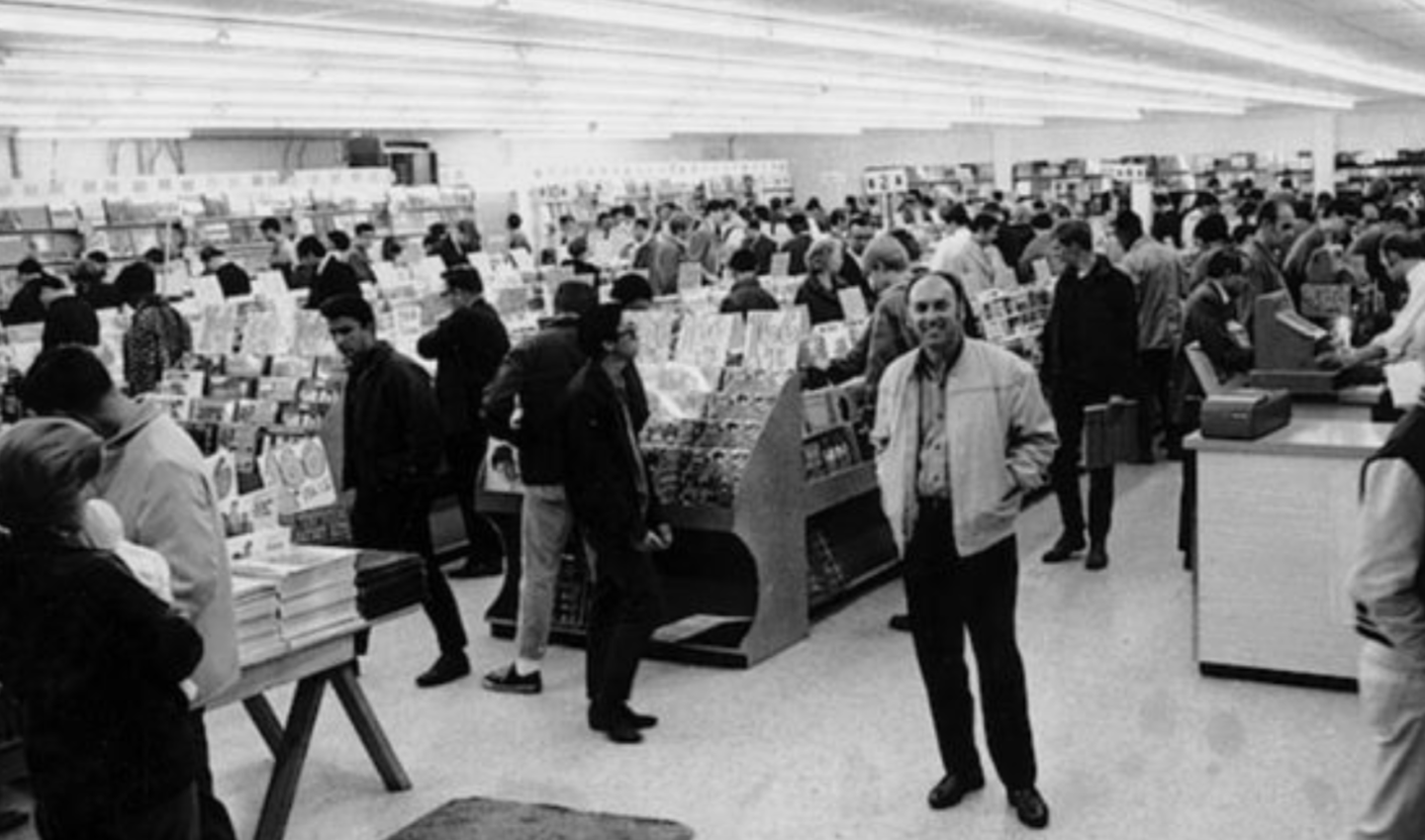Even prior to The Beatles providing hard evidence to stodgy adults that there was value in the music industry–the kind of value they could actually understand from behind the perch of their C.C. Baxter-esque desk row: money–Russ Solomon had the foresight to see it long before anyone else. And in Sacramento no less (that’s right, Greta Gerwig doesn’t own the fucking joint, does she?–just because she’s the only flavor du jour from it right now). A town not frequently associated for innovations in the entertainment and media industry, at least not at that juncture.
That’s precisely why Solomon opened up the first iteration of Tower Records in 1960, named such because it was in father Clayton’s store, Tower Drugs, that he first began selling jukebox records out of. The profit he was making from them led him to the idea to start buying records wholesale and selling them at prices reflective of their newness. So it was that the germination of Tower Records began, which, ultimately, as the documentary on the subject, All Things Must Pass, notes, “put Sacramento on the map.” Probably even more than Joan Didion, Molly Ringwald, The Deftones and Greta Gerwig combined. The voracious, formerly unmet need to be fulfilled in the hearts and ears of not just the local masses of Sacramento, but throughout the United States and beyond became evident quite quickly, and by the late 60s and early 70s Tower had seen its expansion into the other cities people generally associate with California: San Francisco and Los Angeles.
Yet Tower was about more than just “affordable” music (though $18.99 for a CD hardly felt affordable on a teen girl’s shoestring budget–which could often derail her back to the cassette tape section to save a couple dollars). It was a place where people who loved music could coexist together, organically gather. And, upon occasion, know that they weren’t alone–for, as Madonna said, “Music makes the people come together.” In Sacramento’s case, this was especially true, as the scarcity of hangouts in that city is real. This remains possibly even more accurate ever since Tower was forced to shutter (there’s a reason Lady Bird gets excited about hanging out in a parking lot–it’s somewhere to be, something to “do”).
And this sense of community on an eventually global scale was all owed to Solomon. A shark of a businessman and a risk-taker in the face of even the most glaring obstacles that would have scared the more faint-hearted off, Solomon was even so bold as to take his empire overseas at a time when a “small” independent retailer simply did not do such a thing. His unprecedented move into Japan in 1979 marked the first time the country had ever accepted a non-corporate American entity into its fold. And now, said country is one of the only places where Tower still remains as a brick and mortar incarnation.
Yet for all his grand plans for the store–which remained a staple for music lovers to its end–Solomon’s gambles on vast expansion in the 90s caused the business to take on too many debts they could never repay. This paired with gross mismanagement and the advent of internet piracy sounded the inevitable death knell for the company.
Likewise, to hear of Solomon’s March 4th passing is almost like reliving the loss of Tower all over again: we had assumed it would “always” be there as a go-to, and we never imagined it would really go away. But disappear it did. However, even after the empire closed, Solomon couldn’t let go of his passion for music, opening a similar operation called R5 at the same site of the original Tower Records. While the store only lasted two years before being sold to the owners of another independent music store chain in Sacramento–Dimple Records–it proved that even in his eighties, Solomon showed no signs of relinquishing the zeal that launched (literally) a thousand record stores. Incidentally, Solomon was an avid consumer of media to the end, his death occurring while watching the Oscars (no one has speculated that it’s because Lady Bird didn’t win). As Solomon’s son, Michael, told local paper The Sacramento Bee, “Ironically, he was giving his opinion of what someone was wearing [was it Greta Gerwig?] that he thought was ugly, then asked Patti to to refill his whisky.” And before his wife could fulfill her last old school duty, Solomon was gone, suffering a heart attack that took him to a brand new “tower” in the sky at the seasoned age of ninety-two.
A pioneer in every way, even becoming one of the first retailers to take the store online in 1995–which was extremely ahead of its time when one reflects upon it now–Solomon was an indispensable behind-the-scenes icon of music industry, and his legacy is one that, like Gerwig’s (one supposes), has done the capital city of California proud.






















